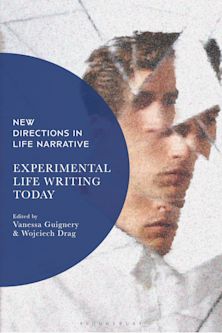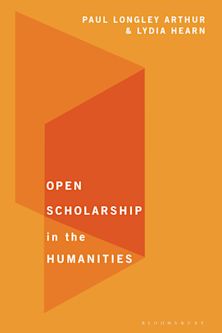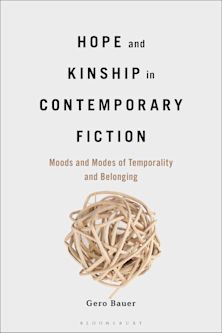- Home
- ACADEMIC
- Literary Studies
- Contemporary Literature
- Ayad Akhtar, the American Nation, and Its Others after 9/11
Ayad Akhtar, the American Nation, and Its Others after 9/11
Homeland Insecurity
Ayad Akhtar, the American Nation, and Its Others after 9/11
Homeland Insecurity
This product is usually dispatched within 10-14 days
- Delivery and returns info
-
Free UK delivery on orders £30 or over
You must sign in to add this item to your wishlist. Please sign in or create an account
Description
Ayad Akhtar, the American Nation, and Its Others After 9/11: Homeland Insecurity examines playwright and novelist Ayad Akhtar’s contributions to multiple genres including film and theatre. This book situates Akhtar’s oeuvre within the social and political context of post-9/11 American culture, marked by the creation of the Homeland Security State and the racialization of Muslims, Arabs, and South Asians. It departs from many traditional studies of 9/11 literature by challenging the binary of victim and perpetrator and examining the continuing impact of the event on questions of American nationalism and belonging. Tracing a literary genealogy for Akhtar, it explores a broad range of issues represented in Akhtar’s works such as globalization, the decline of American industry, terrorism, torture, generational conflicts, interracial love, gender and violence, the conflict between secular and religious values—all issues which affect American nationalism both within and outside the nation’s borders, and shape the lives of South Asian American Muslims. Employing the lenses of trauma studies, transnational feminism, postcolonial theory, and performance studies, this book is attentive to the controversial reception of Akhtar’s works and the paucity of authentic representation of Muslim Americans. It combines literary interpretations of Akhtar’s works with sociological analysis of post-9/11 racial formation, a personal interview with Akhtar, and observations of plays and post-play discussions.
Table of Contents
Introduction: Social and Political Context of 9/11
Chapter 1: The War Within: Masculinity and the Making of Muslim Radicals
Chapter 2: The Racialization of Religion in Ayad Akhtar’s Disgraced and the Play in the American Public Sphere
Chapter 3: Unaccommodated Woman: Muslim Women, Spirituality, and the Public Sphere in American Dervish and The Who and the What
Chapter 4: Dangerous Liaisons: The Nexus of High Finance and Terrorism in The Invisible Hand and Junk
Chapter 5: An Interview with Ayad Akhtar
Conclusion: Theater and the Rebirth of Community
References
Index
About the Author
Product details
| Published | 06 Dec 2018 |
|---|---|
| Format | Hardback |
| Edition | 1st |
| Extent | 208 |
| ISBN | 9781498558242 |
| Imprint | Lexington Books |
| Illustrations | 3 b/w photos; |
| Dimensions | 233 x 162 mm |
| Publisher | Bloomsbury Publishing |
About the contributors
Reviews
-
Not only is the book well-researched and essential to our contemporary understanding of rising nationalism and the othering of minorities, but this monograph is also well-written and easily accessible to both scholars of South Asian American literature and anyone interested in cultural productions on identity formation. . . . A comprehensive examination of Pulitzer Prize winning author Ayad Akhtar’s works was long overdue. With her monograph on Akhtar’s literary productions in post-9/11 America, Basu more than adequately fills this gap. . . Well-structured and analyzed in detail, Basu provides a rigorous exploration of Akhtar’s work. It is both educating and enjoyable to read this book.
Postcolonial Text
-
Basu’s prose and arguments are accessible to a wide audience, which will allow excerpts of the book to be assigned alongside Akhtar’s works in undergraduate and graduate courses on drama, postcolonial literature, and American literature. Ayad Akhtar, the American Nation, and Its Others after 9/11: Homeland Insecurity convincingly demonstrates the literary achievements of Ayad Akhtar and underscores his stature as a major American writer.
South Asian Review
-
A trenchant, much-needed rejoinder to the claim that Pulitzer Prize winning playwright Ayad Akhtar cynically fans the flames of Islamophobia, Lopamudra Basu’s study persuasively recasts his work as a critical response to neoliberal capitalism and American imperialism and as a savvy redeployment of genre conventions that date back to Shakespeare.
Timothy Aubry, Baruch College
-
Ayad Akthar is rightly situated in the constellation of leading playwrights in the 21st century. Through rigorous theorizing, contextualization, and analysis, Basu yields striking new insights into Akthar's meditation on contemporary issues and themes pertinent to South Asian diasporic life and representations of Muslim American realities specifically.
Jocelyn L. Buckner, Chapman University
-
Basu deftly explores Ayad Akhtar’s literary and creative work to study and complicate the conflation of national security with national interest as well as the befouling of institutional politics,
which insidiously bled into the dominant political discourse in the United States and was used to promulgate Islamophobia.Nyla Ali Khan, Rose State College
-
This first book on Akhtar’s work contextualizes it well within an impressive range of scholarly debates and frameworks. Though I would wish for a tougher critical stance, especially regarding his play Disgraced, I appreciate the care Basu takes to situate his writing and establish its stakes in the aftermath of 9/11.
Ambreen Hai, Smith College

ONLINE RESOURCES
Bloomsbury Collections
This book is available on Bloomsbury Collections where your library has access.



































